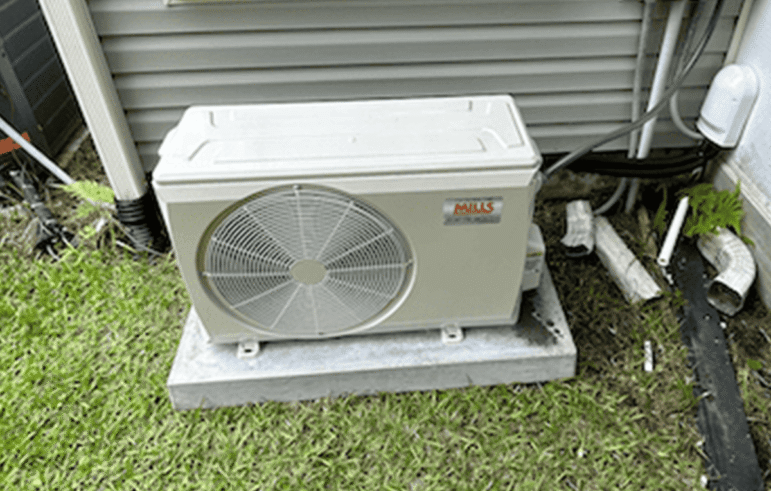
- Posted by: Admin
- 0 Comments
What Size Air Conditioner Do I Need?
Choosing the right size air conditioner isn’t just about comfort. It affects energy costs, humidity control, and how long your system lasts. An AC that’s too large will short cycle and waste energy, while one that’s too small will struggle to keep up on hot days.
At Mills Heating & Air, our comfort consultants take all the guesswork out of the process. With a free consultation, we’ll assess your home and handle every step to help you stay cool and efficient year-round. However, if you’re curious about what goes into choosing the right system, here’s how sizing works.
During AC installation, accurate sizing helps avoid both extremes. Factors like square footage, insulation, ceiling height, and sun exposure all play a role in determining what’s right for your home. Whether you’re replacing an old unit or building a new space, understanding how sizing works is the first step to maintaining a cool, efficient home all summer.
How Do I Calculate the Right AC Size for My Home?
To calculate the right AC size for your home, you’ll need to understand BTUs (British Thermal Units) and tonnage, which measure cooling capacity. One ton equals 12,000 BTUs per hour.
The correct size depends on factors like square footage, ceiling height, insulation, number and size of windows, and how much sunlight enters the home. While rough estimates exist, such as 20 BTUs per square foot, they often fall short.
To be accurate the only way to size an AC unit is through a Manual J load calculation, which Mills Heating & Air performs during your consultation to get it right the first time. Guesswork or relying on basic rules-of-thumb can lead to poor energy efficiency, uneven cooling, and higher utility bills over time. Proper sizing makes a big difference.
What Happens if My Air Conditioner is Too Big or Too Small?
If your air conditioner is too large, it will short cycle, turning on and off too frequently. While this may quickly lower the temperature, it doesn’t give the system enough time to remove humidity from the air, resulting in wasted energy. In hot and humid regions like Fort Walton Beach, this inefficiency can create a sticky and uncomfortable living environment.
On the other hand, if your air conditioner is too small for the hot and humid Florida climate, several issues can arise. Firstly, it may struggle to maintain a comfortable indoor temperature, leaving rooms warm and uncomfortable. Additionally, a smaller unit might be ineffective at removing moisture, leading to a clammy atmosphere. This inefficiency can lead to higher energy bills, as the unit runs more frequently. The continuous strain of operating at full capacity may cause wear and tear, resulting in more repairs and a shorter lifespan for the unit. Furthermore, limited filtering capability may allow dust and allergens to circulate, negatively impacting air quality. You may also notice hot spots in your home where some areas remain uncomfortable while others cool down.
Choosing the right-sized air conditioning unit is essential for ensuring comfort and efficiency in humid climates like Florida. Properly sizing your AC unit is crucial for achieving long-term savings and reliable performance. A well-sized unit maintains steady temperatures, effectively controls humidity, and operates efficiently, making it particularly important for homes along Florida’s Gulf Coast.
Are Ductless Systems Sized Differently Than Central AC?
Yes, ductless systems are sized differently than central air conditioners. Rather than sizing a single unit for the whole home, ductless systems are modular and often sized room by room. This zoning approach makes them ideal for additions, older homes without ductwork, or spaces like sunrooms and garages that need extra cooling.
A comfort consultant from Mills Heating & Air will evaluate each zone’s square footage, insulation, sun exposure, and usage to determine the right BTU rating for that specific area. This tailored method highlights the benefits of ductless air conditioning like precise comfort, energy efficiency, and flexibility.
Unlike central systems, which rely on one unit to cool everything, ductless setups provide targeted control, helping homeowners stay comfortable without overworking their equipment.
Who Can Install My New Air Conditioner in My Area?
Choosing the right air conditioner for your home means more than just picking a model, it’s about selecting the correct size for long-term comfort, efficiency, and performance. Whether you’re considering a central system or a ductless setup, proper sizing is key to avoiding high energy bills, uneven temperatures, and unnecessary wear on your equipment.
A trained HVAC technician can evaluate your home and perform a Manual J load calculation to help guide the decision. At Mills Heating & Air, our comfort consultants are here to walk you through every step, from sizing to installation, so you can rest easy knowing your home is in good hands. Don’t leave it to chance, work with a local expert who understands the climate and your needs. Contact Mills Heating & Air today for AC installation on the Emerald Coast.



